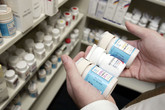Generics/Research
|
Posted 20/05/2016
Generics were first approved in Brazil in 1999. Substitution of generics and reference drugs can occur at the time of purchase and upon patients’ request, and, in the public healthcare system, physicians must prescribe drugs by their Brazilian Common Denomination (Denominação Comum Brasileira – DCB). However, despite legislation that supports their prescription, generics still have a small market share, representing only 27.3% of all drug units sold in Brazil in January 2014. A potential reason for the low penetration of generics into the Brazilian market is a negative perception of the value of generics.























